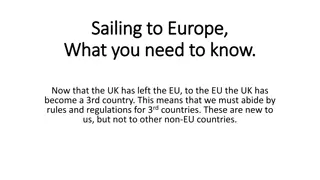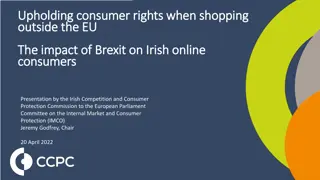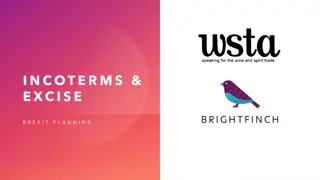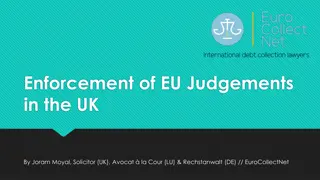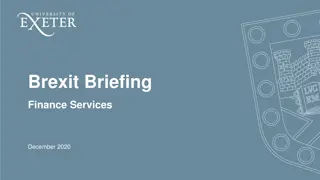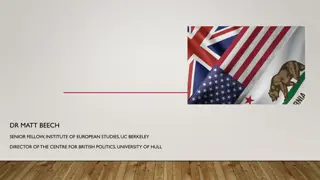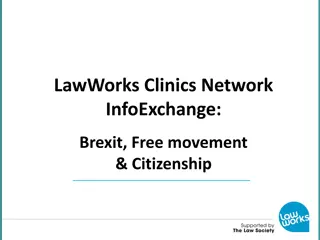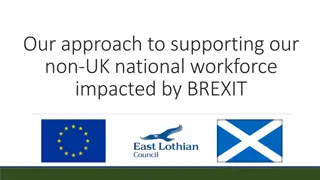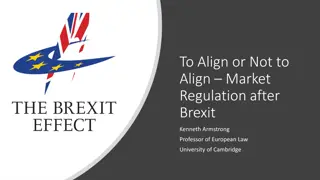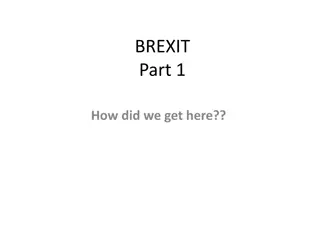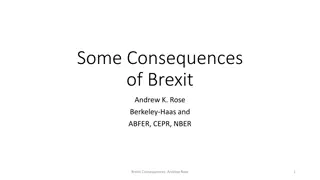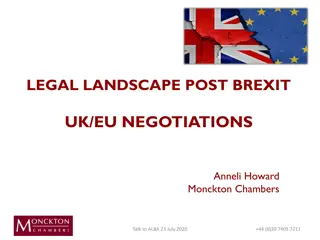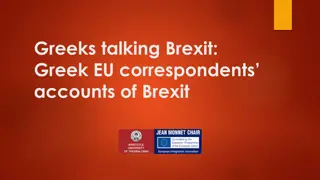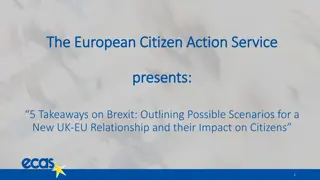
Latest Brexit Update: Insights from Industry Experts
Stay informed on the recent developments and future outcomes of Brexit with valuable insights from EU and UK competition law specialists, Robert Bell and Roman Madej. Understand the current status, potential models, opportunities, threats, and what actions you can take. Explore where UK stands now, key positions, disputes, and predictions for the road ahead.
Download Presentation

Please find below an Image/Link to download the presentation.
The content on the website is provided AS IS for your information and personal use only. It may not be sold, licensed, or shared on other websites without obtaining consent from the author. If you encounter any issues during the download, it is possible that the publisher has removed the file from their server.
You are allowed to download the files provided on this website for personal or commercial use, subject to the condition that they are used lawfully. All files are the property of their respective owners.
The content on the website is provided AS IS for your information and personal use only. It may not be sold, licensed, or shared on other websites without obtaining consent from the author.
E N D
Presentation Transcript
1 1 BREXIT UPDATE BREXIT UPDATE WHAT IS HAPPENING AND WHAT SHOULD HAPPENING AND WHAT SHOULD YOU BE DOING ABOUT IT? YOU BE DOING ABOUT IT? WHAT IS Robert Bell Roman Madej 2 November 2017
2 2 Robert Bell Robert Bell is head of the EU & UK competition team at Bryan Cave with over 20 years of experience advising on complex competition and regulatory matters involving some of the leading cases before the Competition and Markets Authority, the European Commission and UK and European Courts. He advises clients on a range of competition law issues including merger control, cartels, restrictive practices, competition litigation and public procurement law. Robert Bell has a particular sector specialism in advising international technology and media clients on the application of competition law and new media, telecommunications regulation, and on competition litigation. He is currently Chair of the City of London Law Society's Competition Law Committee, which liaises with the UK Government and the EU & UK competition regulators in connection with the reform of competition law and practice. Bell is recognised as one of London s leading lawyers by Chambers UK 2016. Contact: robert.bell@bryancave.com
3 3 Roman Madej Roman Madej advises on all aspects of EU, competition and antitrust law, including merger control, cartels, public procurement and regulatory investigations. He has a particular focus on product distribution throughout the European Union advising clients on how best to protect their brand and business, and also in the area of EU procurement rules providing strategic counsel on submitting bids and challenging the process if irregularities are suspected. In addition, he advises on data privacy, protection and security law issues. Mr. Madej regularly assists US and non-European companies operating in the EU. Recently his experience has encompassed the technology, IT/software and leisure industries. Prior to joining Bryan Cave, Mr. Madej trained at a UK City law firm. This included secondments at Harrods department store in London and the Competition Policy Unit at the UK Government s Department for Business, Innovation & Skills (BIS) where he undertook research for reforms to UK class actions. He is an active contributor to competition law publications and co-authors Bryan Cave s European competition law blog. Contact: roman.madej@bryancave.com
4 4 Agenda Where are we now? The timeline Future outcomes: The Norway model The Swiss model Bespoke trade deal No deal No Brexit UK opportunities and threats Our prediction What should you be doing about it?
5 5 Where are we now? Progress to date: Referendum on 23 June 2016 Article 50 notice on 29 March 2017 EU Withdrawal Bill currently at second reading Current EU position UK s latest position: Two year transitional period Ongoing budget contributions Dispute over arbitration of future legal disputes between EU & UK. UK seeking stand-alone free trade agreement, not based on previous models have your cake and eat it option
6 6 The Timeline March 2019 Date of Exit (subject to transitional period) 19 June 2017 Negotiations Begin 23 June 2016 Referendum 29 March 2017 Article 50 Triggered 12 September 2017 EU Withdrawal Bill Passes Second Reading in Commons March 2021 End of Possible Transitional Period
7 7 Future outcomes
8 8 The Norway model Norway rejected EU Membership in a 1994 referendum with 52% of the vote Norway however a member of both the EEA and EFTA Has single market access but at the cost of abiding by a lot of EU regulation Retains its own agriculture and fisheries policies Not in customs union, so maintains its own external trade policy does not subject non-EU imports to common external tariff. In return: Has little say in decision making Accepts free movement of EU workers Abides by ECJ jurisdiction It s per head contributions to the EU only 25% lower than those of the UK Norway model rejected as an option by the UK
9 9 The Swiss model Rejected EEA Membership in a 1992 referendum with just 50.3% of the vote and then rejected negotiations for EU membership in 2001 with 76% of the vote. Static EU model Schengen agreement accepted by referendum in 2005 However, economy aligned in many areas with that of the EU due to bilateral treaties Free trade of goods with the exception of agriculture Services only some service sectors Has freedom to agree third party trade deals
10 10 Bespoke free trade deal Government s preferred position Deal not predictable as each side will seek to protect their interests. Very likely to still involve financial contributions to the EU but UK would be out of ECJ jurisdiction Effect on: Goods and services Persons Contracts Acquisitions and major investments IP and data protection Funding and taxation Regulation Expect overall more continuity than change
11 11 No deal Could currently happen in March 2019 or further down the road if a transitional deal agreed Significant initial effect on both UK and EU economies: Citizens Trade Customs Regulations Not as likely as some of the media make out Would result in economic pivot away from the EU due to tariffs
12 12 No Brexit For Brexit to be reversed, these are the steps that would have to happen: Early dissolution of Parliament, you need 2/3 MPs to do this Win an election on an anti-Brexit platform (all the anti-Brexit parties lost vote share in the last election) Hold a second referendum and win it in favour of staying in the EU Then persuade EU to reverse process (though this perhaps the easiest step) All of the above before March 2019. More likely soft Brexit through continued membership of EEA and customs union or no-deal due to EU or UK Parliament rejection of negotiated deal
13 13 UK opportunities and threats Opportunities: The EU s lack of worldwide trade deals Close co-operation with EU without political/federal agenda Threats: Dislocation of established trade ties Change of government Free trade agreements not materialising Unending uncertainty
14 14 Our Prediction Limited free trade (mix of Switzerland/Norway models) No longer in customs union Free trade in goods (with exceptions in food products, fisheries and possibly other selected goods) Restricted access for services (financial services, professional services, transport) Free movement of persons in everything but name
15 15 What should you be doing about it? Even a correct decision is wrong when it is taken too late Risk assessment Manufacturing and distribution Restrictions on provision of services Impact on operations in continental Europe Nearly every area of law is likely to be impacted in some way Brexit Assessment Tool
16 16 Brexit Assessment Tool
17 17 Conclusion Ongoing negotiations likely to remain fraught for years Final outcome not predictable, but more becoming clear Brexit will most likely not be reversed, but could be only partly-implemented by a different UK government. Need to plan for Brexit outcome, despite uncertainty
18 18 CLE points CPD points and CLE credit are available for this webinar. CPD points and CLE credit may be collected by emailing: europe.marketing@bryancave.com
19 19 Eu-competitionlaw.com
20 This presentation was prepared by Bryan Cave exclusively for the benefit of the persons attending the presentation and any other persons to whom material used in the presentation is distributed by Bryan Cave. The material used in relation to the presentation and any non-public information conveyed during the presentation is confidential and no part of that material or information may be disclosed or provided to any third party without the prior written permission of Bryan Cave.


